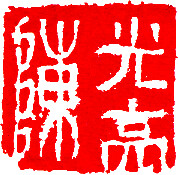|
Friday, June 18, 2004
behold, the golden calf

Possible interpretations of the above picture: 1) it's a pink bunny 2) it's my company's mascot 3) it's pelvic thrusting (take that, take that...) 4) it's anatomically correct - but the front or the back? 5) it's hyper-kawaii (cute) nature is aku (evil) 6) it's funny 7) all of the above .:. I mentioned that my letter might be published in the newspaper i read here in Japan. Turns out they actually did publish it. Whoa. The original unabridged version: To The Editor: I'd like to congratulate the Daily Yomiuri for running the recent article "Swingin' At the Civic Center" by Devin T. Stewart. While to some people the article may have seemed like a trivial piece of writing, it's portrayal of the human side of Chinese immigrants is a good benchmark for any future articles about this community and other immigrants here in Japan. I enjoy the wealth of available English-language press here in Japan, but as an American of Chinese descent, I find it very disturbing that the vast majority of articles printed about Japan's immigrant Chinese community to be incredibly negative. Stories of "Chinese crime" range from simple sensationalism to blatant racist propaganda. Japan's other Asian communities, especially Japanese citizens of Korean descent, also are forced to endure similar accusations from the media. A complete picture of Asian immigrants here in Japan needs be presented in the newspapers and other media - not just a distorted caricature that strips the humanity of Japan's immigrant groups. Recent history is filled with examples of the terrible things that happen when groups of people are no longer consider to be human beings. During WWII in the US, American newspapers screamed the racial epithet "JAP" after the attack on Pearl Harbor and claimed that anybody who was ethnically Japanese was a threat to the country. Soon after, a presidential order robbed over 120,000 Japanese Americans (most of whom were US citizens) of their personal property, legal rights, and dignity - all without trial or solid evidence. They were forcibly rounded up like cattle and sent to hastily built internment camps. While many of the young Nikkei volunteered to fight for America (their all-Japanese American frontline combat unit, the 442nd, became one of the most decorated in American military history), their families were held hostage in the internment camps for the duration of the war. The public did little to stop the entire injustice because they believed what the American media had told them - that all Japanese people were evil, untrustworthy, and being sub-human, they were undeserving of fair treatment. It took over 40 years after the war for their descendents to receive an apology and reparations from the US government. Even today, the scars of that injustice still mar the Japanese American community. That scenario may seem unthinkable here in Japan, but the negative Japanese attitude toward its Asian immigrants inevitably results in mistreatment (both overt and covert), as well as other tangible effects. If Japan is to fulfill its ambitions of boosting friendly relations with neighboring Asian countries and growing a profitable tourism industry, here's the quickest solution: it is imperative that the attitudes of many Japanese people toward Chinese immigrants and other Asian immigrants be changed for the better. Nothing is fixed by the Japanese media's blanket scapegoating of immigrants for issues like crime or the weak economy. The Japanese public needs to see its Asian immigrant community as an opportunity for positive growth - not a threat or burden to the existence of Japan. It's obviously not a simple or easy task to change the public's negative view immediately, but the Japanese media can encourage progress on the issue by balancing its reporting. However, if articles like "Swingin' At the Civic Center" continue to remain rare, the views of the Japanese public will without a doubt, stay negatively biased toward its Asian immigrants. With a biased citizenry, Japan also will continue to bear the stigma of being an xenophobic, unfriendly country - a tragedy since I believe sincerely that Japan's people and culture have a lot to offer to the world around them. .:. Obligatory English teaching story from today: One of my students, Miss I, is a very high level student who's incredibly intelligent, which makes my job easy - I can almost speak to her like I would speak to another native English speaker. That and she fulfills the stereotype that all Japanese airline stewardesses are bijin (beauties, lit. "beautiful people"). Easy on the eyes is always a bonus... heh. Of course, as science has shown, beautiful people are smart. Damn, I hate being ugly. The topic of the conversation: phobias. Gar: So what are you afraid of? Miss I: What do you call being afraid of high places? Gar: Acrophobia. But wait... you're a flight attendant, right? (Miss I smiles) Miss I: Yes. I can't sit by the window. Gar: Eh? I don't believe it. But, I'm an English teacher and I'm shy... do you believe me? (Miss I pauses) Miss I: ... no. haha. .:. Two more days until Father's Day. |
Comments:
Post a Comment
|
in?scrip?tion (n-skrip-shun)n.
the facts.
|










